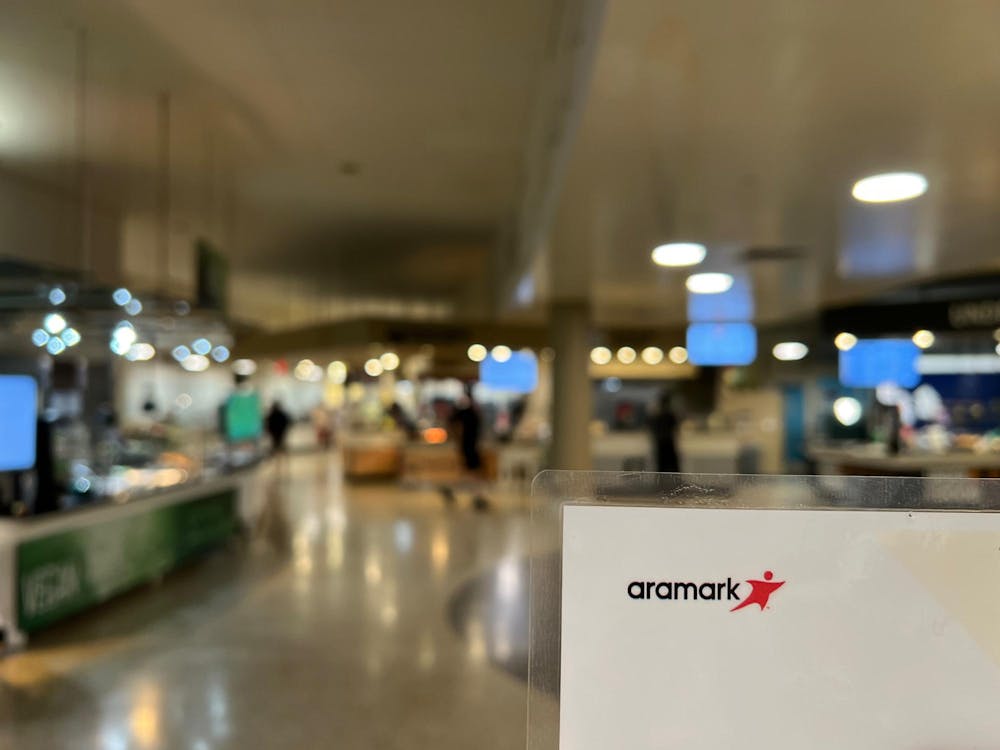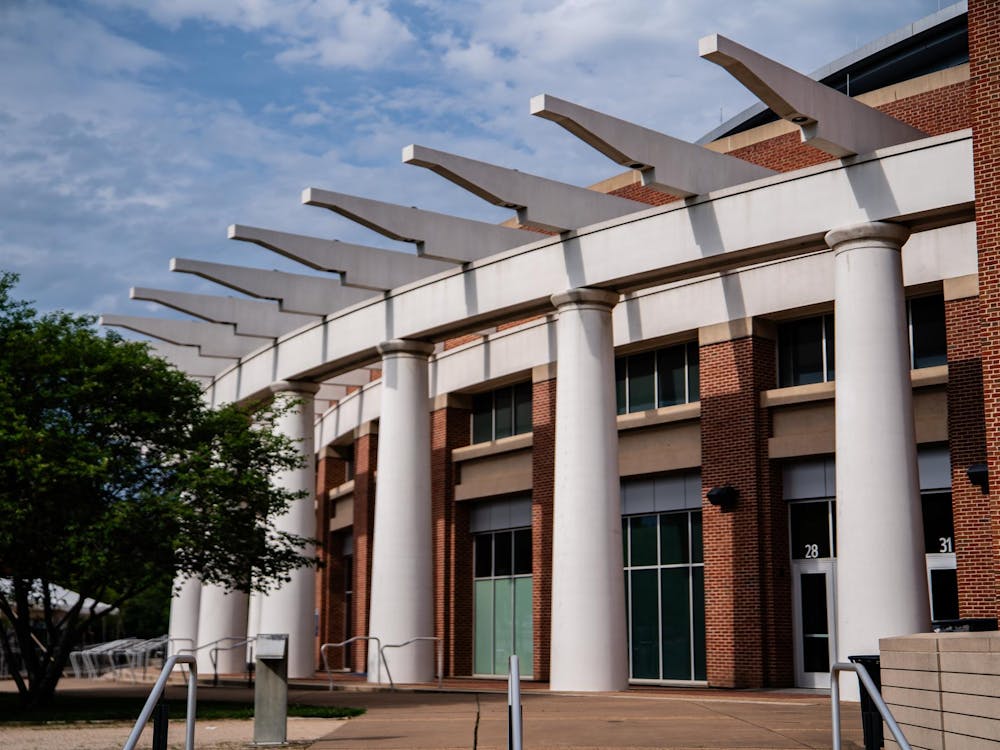In 2014, the University renewed its contract with Aramark — a for-profit company that supplies food and provides other services in various fields, including education, healthcare and government — for an additional 20 years, set to end in 2034. This renewal came after the company had already partnered with U.Va. Dine for over 20 years prior.
According to a U.Va. Today article from 2014, Pat Hogan, executive vice president and chief operating officer at the time, said that the decision to continue the contract followed an 18 month process of assessing the dining program, proposal evaluations and contract negotiations. Ultimately, Hogan said the decision to renew was made because of its benefit to the University community.
“Aramark has been providing these services to U.Va. for more than 20 years, and we are confident that students, faculty, staff, alumni and visitors will continue to benefit from this partnership,” Hogan wrote.
Because the University’s dining ranks lower compared with similar institutions which also use Aramark, The Cavalier Daily submitted a Freedom of Information Act request to the University for its contract with Aramark to understand the specific terms of the agreement.
Along with various school districts across the country, Aramark also contracts with several other colleges, including James Madison University and the University of North Carolina at Chapel Hill. However, compared to these schools, the University receives the lowest campus food rating according to Niche, with a grade of C compared to JMU’s A+ and UNC’s B+.
Despite the lower ranking, the aims of Aramark’s contract with the University are for Aramark to provide goods and services in a manner that supports U.Va. Dine’s vision of the academic mission. This includes accomplishing objectives such as providing high-quality food and service and contributing to a sustainable and healthful lifestyle.
The contract states that Aramark will implement procedures aimed at ensuring that service for customers at the University is “fast, courteous and efficient in all operations.” The contract then goes on to say that the University and Aramark will create joint annual customer satisfaction goals and that Aramark will develop a customer satisfaction program that includes representation from the University community.
Additionally, the contract states that the University reserves the right to administer independent surveys of the University community to determine whether the customer satisfaction goals have been met.
In an email statement to The Cavalier Daily, U.Va. Dine Marketing Manager Andrew Smith listed some ways that U.Va. Dine is allowing for students to provide their feedback. He specifically mentioned the recent implementation of the Text and Tell program which allows students to provide anonymous feedback to U.Va. Dine through QR codes located in the dining halls. This system allows students to notify U.Va. Dine of issues that can be addressed quickly, such as certain stations needing to be restocked.
“One of our recent initiatives is the Text and Tell program, a real-time feedback system that allows students to anonymously text a manager on duty with concerns or suggestions,” Smith said in the written statement. “This ensures faster service and a more responsive dining experience for everyone.”
Smith also said that U.Va. Dine has launched a Student Dining Advisory Board. This group meets monthly and provides a space for students to discuss and collaborate with U.Va. Dine employees on suggestions and new ideas. Smith said the Advisory Board led to the creation of Cilantro and Lime, a new dining concept available at Runk Dining Hall.
Despite these opportunities for student feedback, some students say the food quality at the dining halls leaves much to be desired. Second-year Architecture student Daniel Fleming said that although the dining halls provide a convenient option for food on Grounds, he does not believe the taste or quality is up to par.
“I feel like there’s always something you can find that’s edible, but it will probably not taste very good,” Fleming said. “I feel like the food isn’t of great quality.”
Second-year College student Abem Nida shared similar sentiments on the state of food coming out of the University’s dining halls. She said the food that is served is not very in tune with what students want and said that she has seen improperly prepared meat being served.
“I think [the food] is very bland and there’s not a lot of variety, and if there is it’s rare,” Nida said. “I think there’s been points where I’ve seen chicken that doesn’t really look cooked all the way, so it kind of pushes you away from wanting the dining hall food.”
In the agreement, Aramark receives its profit total gross sales each year, which are payments made to Aramark by the University for meal plan users plus all receipts received by Aramark in relation to its services on Grounds.
Outside of financial gains, Aramark also benefits from the contract in less tangible ways. Smith said that the partnership also allows Aramark to innovate in various areas which can influence the company’s reputation.
“Beyond financial considerations, Aramark benefits in less tangible ways—such as through the opportunity to collaborate with a prestigious academic institution like U.Va.,” Smith said. “This partnership allows Aramark to innovate in areas such as sustainability, nutrition and student engagement, which can serve as a model for other institutions and contribute to its national reputation.”
Each year, Aramark pays to the University a multi-million dollar total guaranteed commission that comes out of the profits made in four different areas of service. These include a dining commission from the dining halls and retail locations, a concessions commission from athletic events and a vending concession from vending services on Grounds.
The contract says that Aramark will pay the greater of a fixed commission set for each year of the contract and a percentage of total annual gross sales. For the first five years of the contract, the dining commission was set at a minimum fixed rate of $5,201,500 per year. Beginning in the 2019-2020 academic year, the commission has gradually increased each year, beginning with a $7,390,820 minimum commission in year 6 of the contract, and ending with a $14,672,510 minimum commission in year 20.
From this dining commission, the University will have received $186,413,433 from Aramark at the end of this contract. When combining this with the other three commissions, the University will have received at least $240 million from Aramark by June 2034. Aramark also makes annual donations to the University, in the sum of $25,000 in scholarship funds per year and $120,000 worth of catering.
In addition to these commissions, Aramark is also making a grant to the University in the amount of $70 million over the course of the twenty year contract. This grant is to be used at the discretion of the University, which it has placed in escrow for “strategic initiatives” by the Board of Visitors.
Aside from the specific terms of the agreement, the Aramark corporation has faced workers’ rights controversies in recent years, both at the University and in other sectors. Over the past two years, Aramark workers at three Philadelphia stadiums have negotiated with their employer to obtain higher wages and healthcare benefits in their new contracts. After several strikes, the corporation struck a tentative deal with the employees that will secure these goals in March.
In March 2020, University Dining employees contracted by Aramark were laid off without notice or severance due to their places of work being shut down as a result of the pandemic. According to the contract, Aramark is responsible for compensation of their employees that work on Grounds, including wages, holiday pay and other paid time off. However, this is part of a list of direct costs that are reimbursable from gross sales.
Other reimbursable costs include the maintenance of small equipment, all food supplies in the dining services program and the cost of all licenses, permits and taxes. Aramark is able to collect all gross sales from vending, concessions and catering services included in the dining services program.
Overall, Aramark is responsible for the upkeep of the space the University allocates it to use, namely the dining halls and other dining areas. This includes financing cleaning supplies, equipment maintenance and replacement of equipment under the value of $7,500. On the other hand, the University is mostly responsible for providing the services that allows Aramark to conduct their duties, including financing building repairs, telephone equipment and trash removal from sites.
Aramark has not only served as the University’s main food supplier over the past few decades, but has also invested in University services and food infrastructure, including funding the renovation of the Fresh Food Company at Newcomb Hall and the creation of the Pavilion XI food court.
The contract also sets standards for Aramark’s compliance with the University’s recycling and sustainability standards. The contract states that Aramark will work with the University to comply with any newly adopted sustainability programs, including increasing the percent of sustainably sourced food products, using biodegradable products at all dining locations and expanding composting facilities.
“Aramark will be proactive in working with the University to bring new sustainability ideas to the University,” the contract said.
The University’s 2030 sustainability plans lay out goals the school aims to achieve in the foreseeable future, such as reducing water use, waste and nitrogen and becoming carbon neutral by 2030. Steps have been taken recently to strive towards more sustainable practices, such as the implementation of reusable to-go boxes at various U.Va. Dine locations.
Despite recent changes, Fleming said that because students have long had complaints about dining hall food, changing food suppliers might bring about more satisfactory results.
“Either change the provider or get a different program going with them,” Fleming said. “For years now the students have been complaining about the food and nothing really has been done.”
Smith said that U.Va. Dine will continue to evolve and enhance the student experience with new dining concepts and events which were designed with the help of student feedback. He said that U.Va. Dine is excited to continue growing with the University community and that they appreciate all voices that contribute to their progress.
“Next semester, we’ll be rolling out even more student engagement-focused events and introducing a few brand-new dining concepts designed with direct input from the U.Va. community,” Smith said. “These upcoming additions reflect our ongoing commitment to listening, adapting and delivering dining options that meet students' needs and preferences.”
If the University chooses not to terminate it prematurely, which there is no expectation of, its contract with Aramark will end following the conclusion of the 2033-2034 academic year.







